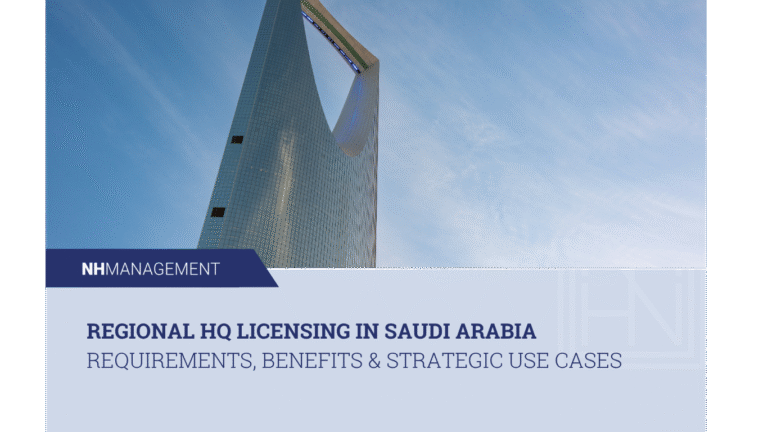Market Entry Strategies for International Businesses: Unlocking the Potential of the UAE and GCC Markets

Effective market entry strategies in the UAE are essential for international businesses seeking growth and regional expansion. The UAE’s stable economy, investor-friendly policies, and global connectivity make it one of the most attractive destinations for foreign investors. However, entering this market requires strategic planning, compliance understanding, and local expertise.
At NH Management, we provide tailored advisory services that help global firms identify the most suitable market entry strategies in the UAE, ensuring seamless incorporation, risk mitigation, and long-term success.
Key Market Entry Strategies in the UAE
1. Joint Ventures
Joint ventures are one of the most common market entry strategies in the UAE, especially for investors seeking local market knowledge.
Advantages: Shared capital and operational risk, access to established networks, and local expertise.
Challenges: Differences in management style, cultural expectations, or profit-sharing may arise without clear governance structures.
2. Wholly-Owned Subsidiaries
Establishing a wholly-owned subsidiary offers full control and strategic independence.
Advantages: Greater autonomy in decision-making, brand consistency, and full ownership of profits.
Challenges: Requires higher initial investment and exposure to market risks, particularly for first-time entrants.
3. Franchising
Franchising enables international brands to enter the UAE market quickly while leveraging existing brand recognition.
Advantages: Low upfront investment, rapid expansion, and access to ready consumers.
Challenges: Maintaining brand quality and service standards across franchises can be complex.
4. Exporting
Exporting is the simplest among market entry strategies in the UAE, allowing companies to test market response with minimal investment.
Advantages: Low risk, flexibility to exit, and use of existing production facilities.
Challenges: Limited local presence and potential logistical or customs challenges.
5. Strategic Alliances
Strategic alliances help foreign investors collaborate with local firms to share expertise and technology.
Advantages: Combined resources, innovation sharing, and stronger market positioning.
Challenges: Coordination difficulties and dependency on partner performance may occur if not managed effectively.
Benefits of Entering the UAE and GCC Markets
1. Strategic Location
The UAE’s position as a global hub provides unmatched access to Asia, Africa, and Europe, making it ideal for logistics, trade, and regional headquarters.
2. Economic Diversification
Government-led initiatives such as UAE Vision 2031 and Saudi Vision 2030 support diversification beyond oil into technology, renewable energy, healthcare, and finance.
3. Business-Friendly Environment
Free zones allow 100% foreign ownership, simplified incorporation, and various tax benefits, creating one of the most appealing investment climates globally.
(For official information, visit the UAE Government Business Portal).
Challenges of Entering the UAE and GCC Markets
Regulatory Compliance
Foreign investors must navigate licensing rules, free zone regulations, and ownership laws — a process best managed with professional local support.
Cultural Understanding
Adapting to Arabic business etiquette and relationship-based negotiations is key to building trust and credibility.
Market Competition
The UAE attracts leading international brands, making it essential to establish a clear value proposition and sustainable differentiation.
Expanding into the UAE requires careful evaluation of regulatory frameworks, taxation, and ownership structures. The right market entry strategies in the UAE depend on your company’s objectives, sector, and long-term vision. Whether you aim to establish a representative office, open a free zone entity, or create a mainland presence, understanding the compliance landscape is key to success.
At NH Management, we help clients identify and execute the most suitable market entry strategies in the UAE, ensuring alignment with local laws, investor protection frameworks, and commercial objectives. Our consultants manage the entire process — from feasibility studies and entity setup to ongoing compliance and governance support.
Businesses can also explore our detailed overview on company incorporation to learn how to structure their operations efficiently within the UAE’s regulatory framework.
For further guidance, investors may visit the UAE Government Business Portal, which provides official insights on starting and managing a business in the Emirates.
How NH Management Helps You Enter the UAE Market
At NH Management, we help global investors design and implement the most effective market entry strategies in the UAE. Our expertise spans across DIFC, ADGM, and mainland jurisdictions, offering clients a complete roadmap for company incorporation, licensing, and ongoing compliance.
Whether your business seeks to open a subsidiary, form a joint venture, or expand via a franchise, NH Management provides end-to-end support — from feasibility studies to regulatory approvals.
If your company is ready to enter the UAE or GCC markets, our consultants can guide you through every step of the process.
Contact us today at in**@**********nt.com or call +971 4 222 1327 to schedule a consultation.







